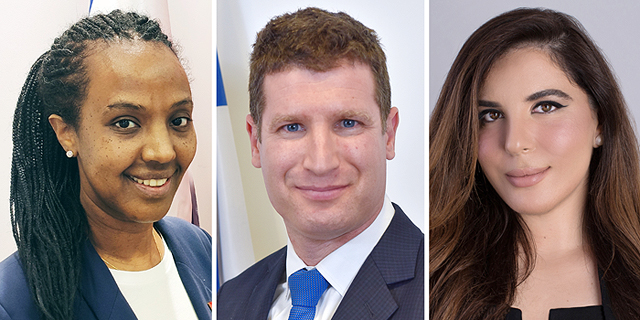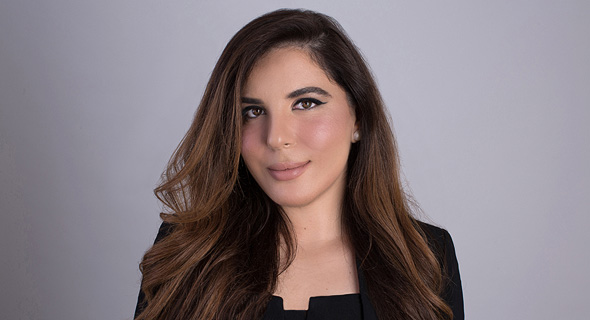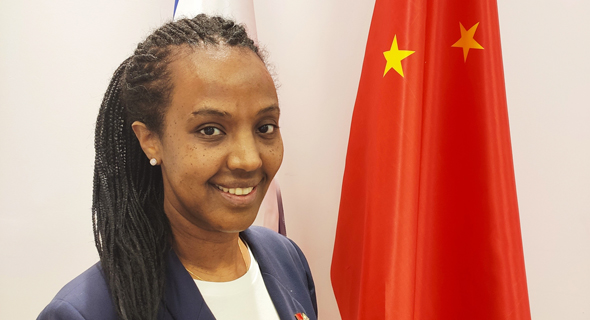
DiplomaTech
Israel’s tech envoys identify challenges and opportunities of the post-covid world
Bareket Knafo (Romania and Ukraine), Shai Zarivatch (Australia) and Esti Ayalon Kovo (Beijing) discuss the biggest lesson they learned from the pandemic and what they believe will be the trends of 2021
The Covid-19 pandemic has forced the Foreign Trade Administrations (FTA) at the Israeli Ministry of Economy & Industry, and its economic attachés across the globe to completely rethink their role in the world of economic diplomacy. While facing an unprecedented financial crisis and a fog of uncertainty, the attachés discovered that many of their previous strategic tools became almost irrelevant. Simultaneously, the Israeli industry found that they needed them more than ever. After all, how else could an Israeli exporter promote cross-border trade transactions in remote regions, where technology cannot bridge the closed sky and cultural differences?
CTech asked five of Israel's Economic & Trade attachés to discuss the biggest lesson they learned from the pandemic and 2020, as well as what they believe will be the trends of 2021 and where they intend to focus their efforts in the coming year.
Part one of this two article series will feature Bareket Knafo (Romania and Ukraine), Shai Zarivatch (Australia) and Esti Ayalon Kovo (Beijing).
"We are here, on the ground, speak the language, understand the history and local mentality, and the interrelations between the public and private sectors. And we know how to bring tangible results," said Knafo. "As the head of the Economic and Trade Mission of Israel to Romania and Ukraine, I have learned invaluable lessons on the importance of flexible management and how to turn challenges and obstacles into opportunities."Zarivatch spoke of how after a short period of adjustment, the economic missions shifted their work to the online virtual space and in no-time, many conferences and business events started to emerge. They began from fairly small and dedicated webinars focusing on Covid-19 and healthcare-related matters and grew to dedicated and professional business events, and then large exhibitions and conferences with professional speakers and pre-scheduled 1:1 business rooms, thus largely copying the experience of attending a global conference and exhibition.
"This change and the adaptation to the new way of doing business, bridging and connecting between companies and representatives from both countries and markets which are far from each other, made us rethink altogether how we lived, worked and engaged before Covid, and how things will be after," explained Zarivatch. "It became evident that so many meetings could be held and so much time saved when using online platforms and indeed the volume of events, direct business interactions, and commercial engagements have skyrocketed after our work-plan for the second part of the year had been utterly disrupted and a new, modified plan for the Covid era was put in place instead." Ayalon Kovo hailed 2020 as "a year of great trials" for the economic missions. "Wherever there is a crisis, there is an opportunity," she explained. "We witnessed distress and suffering from a threatening and unknown virus, but on the other hand, we were amazed at how resilient people can be. Taking this opportunity to research for new methods of coping with Covid-19, such as the development of remote monitoring, online treatment and digital health, things that usually take years to develop and produce, were put on a super-fast track and have been successfully implemented to the market in a few weeks. "We still see a strong economic relationship developing with major trading partners. For example, the export of medical devices from Israel to China in 2019 accounted for 17% of Israel’s total export to China. During Covid-19, in 2020, Israeli medical product export to China increased by more than 2%, reaching almost 20% of Israeli total export to China." Ayalon Kovo added that she is expecting an increase in investment by the government and the private sector in the healthcare sector with major trends being digital health, healthy aging, biotech and disease control prevention. Knafo said the pandemic has also paved the way for future development in the Health-Tech sector, explaining that "the evolving digitalization of the healthcare arena coupled with the shortage of skilled cybersecurity professionals and the increasing cyber hazards - presents ample opportunities for the Israeli industry." Cybersecurity, in general, will be pushed to the fore more than ever before, according to Knafo. "The exponential growth in the scope, volume, and sophistication of malicious cybersecurity attacks in 2020 exposed an alarming reality: many industries are vulnerable, unprepared, and often lack adequate infrastructure and trained personnel. 2021 will be an important year for the global cyber industry. We already see a tremendous increase in the investment of public and private players in cyber protection. Amid the worldwide raging unemployment rates, we have also witnessed a continuous boost in cybersecurity job vacancies," noted Knafo. Zarivatch said that while 2021 brings with its large amounts of uncertainty, there is also plenty to be hopeful about. "On the one hand, we continue with the practices of communicating, meetings, engaging and holding online business events, together with professional conferences and exhibitions, as was done through most of last year. At the same time, we hope that borders will be opened and travel will become possible, and while uncertainty continues to reign – we prepare for both," explained Zarivatch. "Most of our activities, projects and initiatives this year promoting the sectors we feel represent the most relevant and promising for trade, economic and investment relations between Israel and Australia (cybersecurity, digital healthcare and Agtech to name a few) will continue to be held online. This means that Australian corporates, businesses, as well as investors and organizations we’re targeting, will designate sector professionals who will be meeting and presenting to Israeli companies and startups to discuss business, technological and investment cooperation. That said, we cannot ignore both countries’ visible achievements tackling the spread of the virus, especially with the ongoing large-scale roll-out of Covid vaccines in Israel. We are preparing for the same but looking forward with positive expectations that from the second part of the year, things will be utterly different and better. This makes us look forward with firm belief that the change and gradual return to pre-Covid practices - is around the corner and will be implemented sooner than we think." Regarding the Australian mission's main focus this year, Zarivatch said that the Australian economy is by and large modern, advanced and competitive, and is open and interconnected with global markets, providing a myriad of business opportunities to the Israeli industry, especially in the tech domains. "To learn more about the characteristics of the Australian economy and the opportunities it creates for the Israeli industry - I invite everyone to read the economic overview I prepared where I listed the exact sectors, their needs and future growth plans, including Australia’s government initiatives to grow in the future," said Zarivatch. "Having said that, the Australian industry is characterized by very large industries in mining and resources, as well as agriculture, both have many shortcomings, growing challenges (many of them driven by geopolitics of the region) and technological demands. "For example, the threats of cyberattacks are imminent and ever growing, and awareness of the need to integrate advanced cyber defense and security IT systems in Australian corporates and businesses is high. In addition, Australia is also suffering from ongoing water shortages and challenges which only get worse over time, driven by seasonal bushfires and year-on-year draughts which require advanced water management tools and technologies which Israel, the best water laboratory in the world, can provide. Australia is also very keen to adopt Data Analytics and Artificial Intelligence to upgrade its industrial production and move towards an advanced manufacturing hub, as such they are confident that Israeli knowledge and knowhow can provide them with the means to scale up, become more globally competitive and enjoy a closer cooperation with Israel." Ayalon Kovo said that the last year presented new opportunities to help Israeli companies get a foothold in the Chinese market. "This year we will continue to help Israeli companies enter the Chinese market and show that Israel is an important trade partner with China. We will increase our reach to Israeli companies and cement our role as the go-to address for companies in China," said Ayalon Kovo. Knafo broke down the three main objectives of the mission to Romania in 2021. "Firstly, enhancing the bilateral trade in already booming sectors such as cyber, homeland security, digital health, energy, agriculture, and water management. We have already established strong connections with the private and public sectors in Romania, and we expect to see further success stories of Israeli companies in these domains. We will use our presence on the ground and vast connections to assist Israeli exporters in succeeding in the Romanian market," she said. "The pandemic has also accelerated digitization processes in diverse fields, consequently opening the door for Israeli solutions in relatively 'new' operational sectors. For example, we observe a growing interest in fintech and smart city solutions. Lastly, Romania has placed itself as a key player in the European arena: As the new cyber capital city of Europe, Bucharest will soon host the EU Cybersecurity Industrial, Technology, and Research Competence Center. "Romania is also expected to enjoy unprecedented rescue and aid funds from the EU (approximately 80 billion Euros), and international financial institutions such as EBRD and the World Bank have already been targeting it for their large-scale projects. Undeniably, Israeli technologies could be proved relevant and even essential for such projects."

